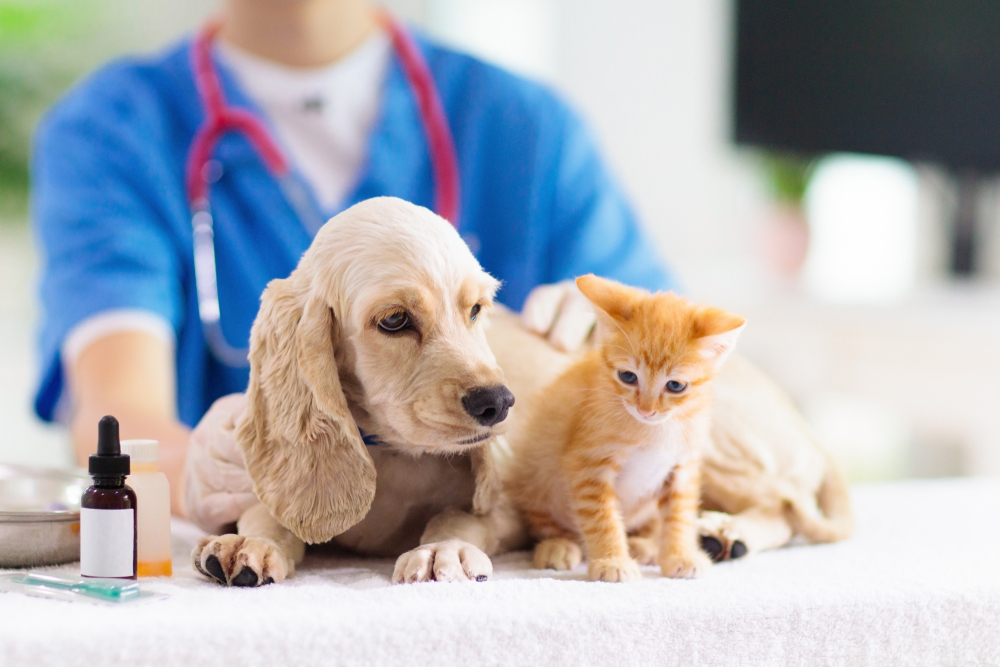
According to the American Veterinary Medical Association, “Vaccinations protect your pet from highly contagious and deadly diseases and improve your pet’s overall quality of life.” Serious diseases like distemper and rabies can spread to unvaccinated cats and dogs, and some diseases — like rabies — can spread from pets to their owners. Not only do vaccines protect your fur babies, but they also keep you safe from transmissible diseases. Additionally, some areas require you to vaccinate your pets before taking up residency. But does pet insurance cover vaccines? Let’s take a closer look at vaccines, whether pet insurance usually covers them, and other ways you can offset the cost.
How do vaccines work?
Vaccines are composed of antigens, which resemble the organisms that cause disease. When your pet is vaccinated, it stimulates the immune system into fighting off something that looks like the real disease. If your pet is exposed to the disease in the future, her immune system recognizes it and (in most cases) fends it off completely. At the very least, vaccines drastically reduce the severity of the disease, making the symptoms manageable.
There are numerous vaccines available, so it’s essential to discuss the proper protocol for your pet with her veterinarian. Depending on your pet’s age, lifestyle, and medical history, your fur baby may not need to be vaccinated for everything.
When should you vaccinate your pets?
Before kittens and puppies are 6–8 weeks old, they receive antibiotics from their mother’s milk (as long as she’s been vaccinated and has a healthy immune system). After that, your veterinarian will need to give your pet vaccines and boosters until she’s 16 weeks old. Adult dogs and cats will need annual vaccines, with some vaccines lasting up to three years before the animals require another injection. Most veterinarians send vaccine updates in the mail to let you know when your pet is due for her vaccine, but we recommend keeping track of it at home just in case they forget to notify you — or if the card gets lost in the mail.
Does pet insurance cover vaccinations?
We don’t blame you if you’ve frantically Googled some variation of “pet insurance vaccinations” only to walk away feeling more confused than ever. Insurance lingo can be tricky to understand, and that’s doubly true for pet insurance. So, does pet insurance cover vaccinations? If you want to get technical, no. Traditional pet insurance covers illness and injury, but general health care for things like dental cleanings and vaccinations isn’t covered. However, if you opt for a wellness plan (which isn’t considered a true health insurance policy), routine care like dental visits, vaccines, and even microchipping is covered. The definition of routine care depends on the provider, but almost all wellness plans recognize the importance of vaccinations.

Does your pet need an insurance policy and a wellness plan?
With a wellness plan, you’ll be reimbursed for checkups, preventive care, vaccinations, and more, but wellness plans don’t cover accidents and injuries. Depending on your budget, you may want to insure your pet with a traditional insurance policy and add on a wellness plan to cover dental cleanings and vaccinations. Some pets may not qualify for insurance for a variety of reasons, such as their age or preexisting conditions. Additionally, some breeds are more expensive than others, which can make the cost of a pet insurance policy prohibitive. In that case, a wellness plan (along with plenty of exercise and a nutrient-rich diet) can help prevent ailments and improve your pet’s quality of life.
What can you do if you need help paying for vaccinations?
While cat vaccinations aren’t that expensive (around $50 for a rabies vaccine), vaccinations for dogs can range anywhere from $100 to $350 annually. If you’ve already stretched your budget thin, that doesn’t mean you can’t find help to afford the essential vaccinations your pet needs. We have a few tips that can help you out.
- Apply for CareCredit: CareCredit is a credit card that can help you pay for checkups, treatments, dental care, and vaccines.
- Work out a deal with your veterinarian: While not all vets are willing to work with you, some will set up payment plans, help you with financing options, or defer your payments until you can pay for your pet’s vaccinations.
- Turn to crowdfunding: Many people can pay for incredibly expensive treatments for sick pets thanks to crowdfunding. If you’re strapped for cash, think about setting up a page for your pet’s vaccine bills.
- Look for a low-cost clinic in your area: If your area has an affordable veterinary clinic, it never hurts to give them a call and ask about their prices.

Vaccinations protect your pet against transmissible diseases, some of which can even spread to humans. But the annual cost of vaccinations can be difficult for some of us to afford without help. If it’s within your budget, a wellness plan that covers vaccine costs is a fantastic way to ensure your pet stays protected. And if a wellness plan is outside your price range, that’s okay, too. You may be able to work out a payment plan or use another option we’ve suggested to help cover the cost. The only thing we don’t recommend? Skipping vaccinations.
Editors' Recommendations
- Why does my dog have a bald patch on their tail? Here are the answers you need
- This is the ultimate week-by-week puppy training schedule every new pet parent needs
- What you need to know about your cat’s swollen lip – what caused it and how to help it heal
- Can cats have autism? Here’s what to know about unusual behavior in cats
- Best reptile pets: These are the 5 most affectionate reptiles you can welcome into your home




